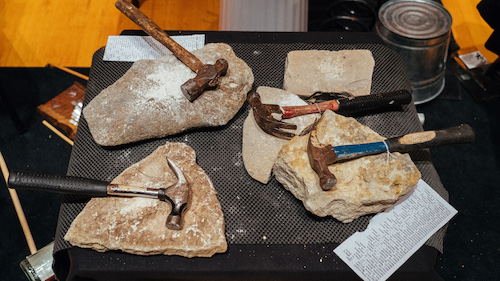by David Kulma

Percussionists Allen Otte and John Lane came together for a performance of their work The Innocents on Saturday, September 14 in Ludwig Recital Hall on Kent State’s Vanguard New Music Series.
First created as part of a larger artistic collaboration more than a decade ago, the current incarnation of this “dramatic soundscape” featured Otte and Lane playing both recognizable musical instruments like mbiras and the harmonica alongside everyday objects — they jingled keys, struck stones with hammers, and slammed books shut. They spoke in clear, direct language as well as in opaque metaphors to underline their theme: the injustice of our criminal justice system, specifically locking people up for crimes they didn’t commit.
Casting light on a horrible problem most people know little about, Otte and Lane took the audience on a 17-part tour. From the opening of Frederic Rzewski’s The Fall of the Empire — a work the political composer extraordinaire wrote for Otte — they led us through many discombobulating and oddly captivating moods, using such techniques as shouting, playing an electronic backdrop that included the voices of the wrongly incarcerated, and engaging in purposefully overlong, mundane tasks accompanied by surprisingly music-worthy sounds.
The Innocents exceeds the sum of its many parts in a bewilderingly contemplative hour. Otte and Lane are clearly astounding percussionists, as evidenced by the great variety of ways they produced sound — from delicate mbira playing to vigorous hammering of big rocks that sent up dust. They crumpled newspapers, Lane sang the blues, and Otte tore up posters of prison numbers to an electronic ostinato of “they didn’t do the crime.”
The most captivating section that proved the efficacy of performance art had a spine-tingling quality. Otte and Lane handled books for minutes on end while they read an ever-lengthening text asking someone to recount a dream. The beautiful sounds of rubbing the books on the table, turning and fingering their pages, opening and closing them quietly and loudly, and writing with pencils, all underlined the banality of how long it takes to reverse a conviction and emphasized how many people are still rotting in these circumstances.
Some of the words were hard to understand. It would have been helpful for the audience to be able to ask questions and gain a better grasp of the issue. (There was a pre-concert event three hours before the performance.) Otte and Lane have clearly spent a lot of time thinking about this subject, and their insights would have deepened the experience of this short work.
Published on ClevelandClassical.com September 24, 2019.
Click here for a printable copy of this article


